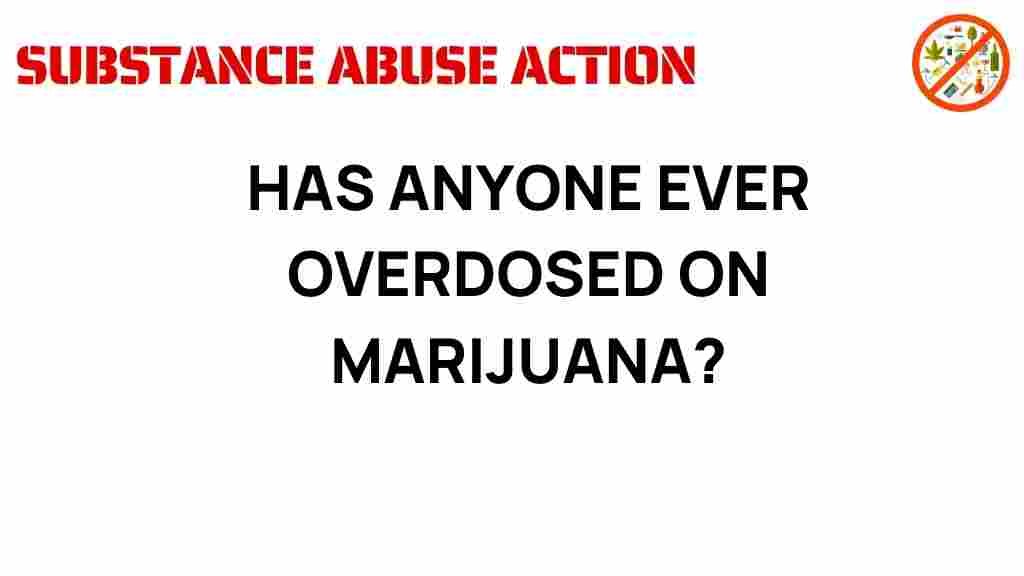The Surprising Truth: Has Anyone Ever Overdosed on Marijuana?
As the conversation surrounding marijuana continues to evolve, so do the myths and facts about its safety and effects. One of the most common questions is whether someone can overdose on marijuana. With the increasing legalization of cannabis in various parts of the world, understanding the realities of marijuana overdose is more important than ever. In this article, we will delve into the concept of marijuana overdose, explore the health risks associated with cannabis use, and address the public perception influenced by prevalent drug myths.
Understanding Marijuana Overdose
To start, it’s crucial to clarify what an overdose means in the context of marijuana. Unlike many other substances, marijuana, particularly its psychoactive component tetrahydrocannabinol (THC), does not typically result in fatal overdoses. The body has a remarkably high tolerance for cannabis, making it difficult to consume a lethal amount. However, this does not mean that excessive consumption is without consequences.
What Happens During a Marijuana Overdose?
While you may not face the life-threatening dangers associated with overdosing on substances like opioids or alcohol, consuming high doses of THC can lead to a range of uncomfortable symptoms. These may include:
- Severe anxiety or panic attacks
- Paranoia
- Increased heart rate
- Nausea and vomiting
- Confusion or disorientation
- Hallucinations
These effects can be particularly distressing for inexperienced users or those consuming edibles, which can take longer to take effect, leading to the temptation to consume more.
Factors Influencing THC Effects
The effects of THC can vary significantly from person to person, influenced by several factors:
- Individual tolerance: Regular users often develop a tolerance to THC, experiencing milder effects compared to occasional users.
- Method of consumption: Smoking, vaping, edibles, and tinctures deliver THC differently. Edibles, for example, can result in stronger and longer-lasting effects.
- Dosage: Higher doses of THC are more likely to lead to adverse effects.
- Set and setting: A person’s mental state and environment can greatly influence their experience with cannabis.
Common Myths About Marijuana Use
Despite the growing body of cannabis research, many myths persist regarding marijuana use and overdose. Some of these include:
- Myth 1: Marijuana is completely safe and has no risks.
- Myth 2: You can die from smoking too much marijuana.
- Myth 3: All cannabis products provide the same effects.
- Myth 4: Marijuana is not addictive.
Addressing these misconceptions is vital for cannabis safety and responsible use.
Health Risks of Marijuana Use
While marijuana may not pose the same overdose risks as other drugs, it is essential to be aware of the potential health risks associated with its use. Some of the significant concerns include:
- Dependency and addiction: Although many people can use marijuana without developing dependence, some individuals may find that they become reliant on it, particularly if they use it as a coping mechanism for stress or anxiety.
- Respiratory issues: Smoking marijuana can have adverse effects on lung health, similar to smoking tobacco.
- Impaired cognitive function: High doses of THC can impair short-term memory and attention span, which can be especially concerning for young users.
- Interactions with other medications: Cannabis can interact with various medications, altering their effectiveness or causing adverse effects.
Public Perception of Marijuana
The public perception of marijuana is shifting, especially as legalization efforts gain momentum. However, stigma and misinformation still hinder responsible discussions about its use. Understanding the facts can help dispel myths and promote a more balanced view of cannabis.
How to Use Marijuana Responsibly
If you’re considering using marijuana, it’s crucial to prioritize safety and informed decision-making. Here are some tips for responsible use:
- Start low and go slow: If you’re new to cannabis, begin with a low dose to understand how it affects you.
- Choose the right method: Consider various consumption methods (like vaping or edibles) and how they may affect your experience.
- Know your source: Use products from reputable sources that provide lab testing to ensure quality and safety.
- Be aware of your environment: Use cannabis in a safe and comfortable setting to enhance your experience and reduce anxiety.
- Stay informed: Keep up to date with the latest cannabis research and understand the effects of different strains and products.
Troubleshooting Tips for Unpleasant Experiences
In the event of an unpleasant experience while using marijuana, here are some tips to help you calm down:
- Stay calm: Remind yourself that the effects are temporary and will pass.
- Hydrate: Drink water to stay hydrated; this can help mitigate some symptoms.
- Change your environment: If possible, move to a quieter, more comfortable space.
- Use CBD: Cannabidiol (CBD) can counteract some of the psychoactive effects of THC and may help you feel more at ease.
- Seek support: If you’re feeling overwhelmed, reach out to a trusted friend or family member for comfort.
Conclusion
In conclusion, while the notion of marijuana overdose may be exaggerated, it is vital to understand the potential health risks and effects associated with cannabis use. By addressing drug myths, promoting cannabis safety, and encouraging responsible use, we can cultivate a more informed public perception of marijuana. With ongoing cannabis research and education, individuals can make choices that prioritize their health and well-being. Remember, knowledge is power when it comes to cannabis use.
For more information on cannabis safety and responsible use, check out this resource on cannabis research.
And to further explore drug myths and health risks, visit this informative site.
This article is in the category Health and created by SubstanceAbuseAction Team
